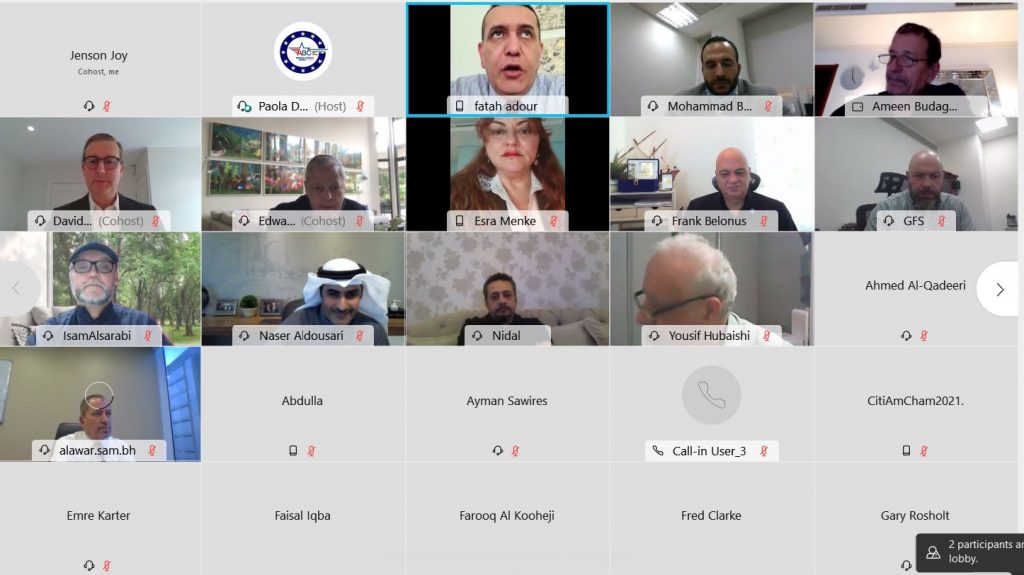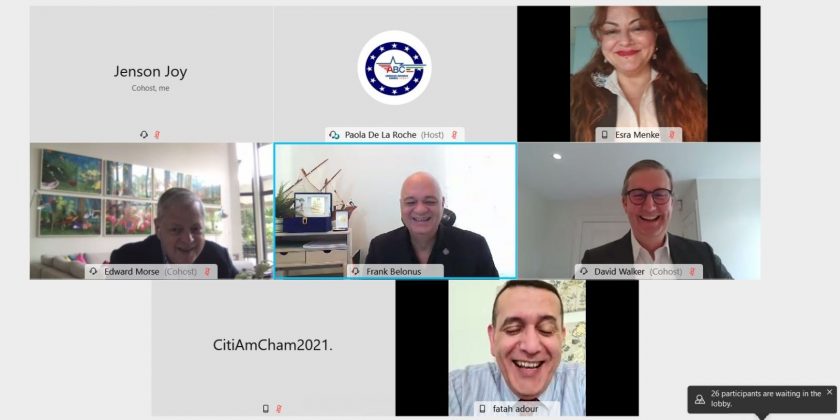ABCK- AmCham Kuwait in coordination with Citigroup held a fireside chat with Citi Group’s Global Head of Commodities Strategy Citi Research Dr. Edward Morse. The event was supported by the American Chambers of Commerce in Abu Dhabi, Bahrain, Qatar, Oman, and Saudi Arabia.
Mr. Fatah Adour, General Manager of Citibank Kuwait kick started the webinar by thanking the participants for their attendance and AmChams in GCC for their collaboration in this webinar then handed over to Mr. David walker, Head of Public Sector Banking for Citigroup in Europe, Middle East and Africa to moderate the discussions with Dr. Morse.
Dr. Morse thanked the chambers for their efforts in setting up the webinar and hoped that next year’s webinar would be in person. On the oil market, Dr. Morse noted that it has been on the rise by 75% since November 2020 and that there are several factors that led to a dramatic drop in global oil inventories like crude oil. These include the willingness of OPEC to withhold oil from the market for a longer period, which was aided by Saudi Arabia’s decision to take out one million barrels extra a day for the February and March months.
Dr. Morse explained that this also boosted demand that was unanticipated because of the pandemic becoming more in control. He continued: “The oil prices have gotten ahead of themselves in terms of rebalancing of demand and supply fundamentals; the sign we look at every single week is the ratio of people who are long in the financial market against people who are short in the financial market and that ratio now shows a bit of exuberance”.
Dr. Morse noted that one must look at “money managers”, large-scale institutional investors which include pension funds and hedge funds. This group of investors is always investing “long” due to the pension funds and other institutional investors having a bias in investing in long only instruments. “The ratio has gone above average which brought the oil prices up as well which is anticipated to stay as is for the year”.
Dr. Morse discussed commodities and their super-cycles as he emphasized the fact that all last year, out of 32 commodities like base metals, emissions, and fuel, 25 of them were down in price in the beginning of the year and 7 were up in price like gold and silver. He added: “Oil and gas were down last year, but 27 of the commodities are now up in 2021 and 5 are down”. Dr. Morse also warned that some people thought there will be a massive supply gap; he explained: “We had a dip in pricing, starting 2014 that lasted until 2016, the world in 2014 was spending a little less than 900 billion dollars a year in finding and developing oil”. Between 2014 and 2016, the spending fell by more than 50%. The International Energy Agency announced that unless there is an upturn in new investment, there will be 25 million barrel a day in supply by 2020 and even after 2014 the number never went above 500 billion dollars. As a result, the average cost of finding oil went down.
As for geopolitical concerns, Morse mentioned the 2016 agreement between Russia and Saudi Arabia while covering its political connotation. He said that both countries signed an agreement for bilateral cooperation in the oil market. From an oil perspective, 2016 was an existential moment for oil producing countries due to the fall to $30 a barrel for oil and its fluctuation throughout the year and that Saudi Arabia has a price currency that has been pegged to the U.S. Dollars.
He concluded the talk by addressing the change from oil to the energy transition. He mentioned that there are energy companies that want to reduce their carbon footprint without changing the nature of their business by altering their supply line so they are supported by cleaner energy and they believe they can survive as an energy firm producing hydro carbons. They do not believe it is worth their investing in alternative energy and to eradicate oil and natural gas in their energy systems. He also noted that alternative energy like solar energy have seen their costs down by 15% per year for ten years making it competitive with coal.
The event concluded with closing remarks by the Chairman.


